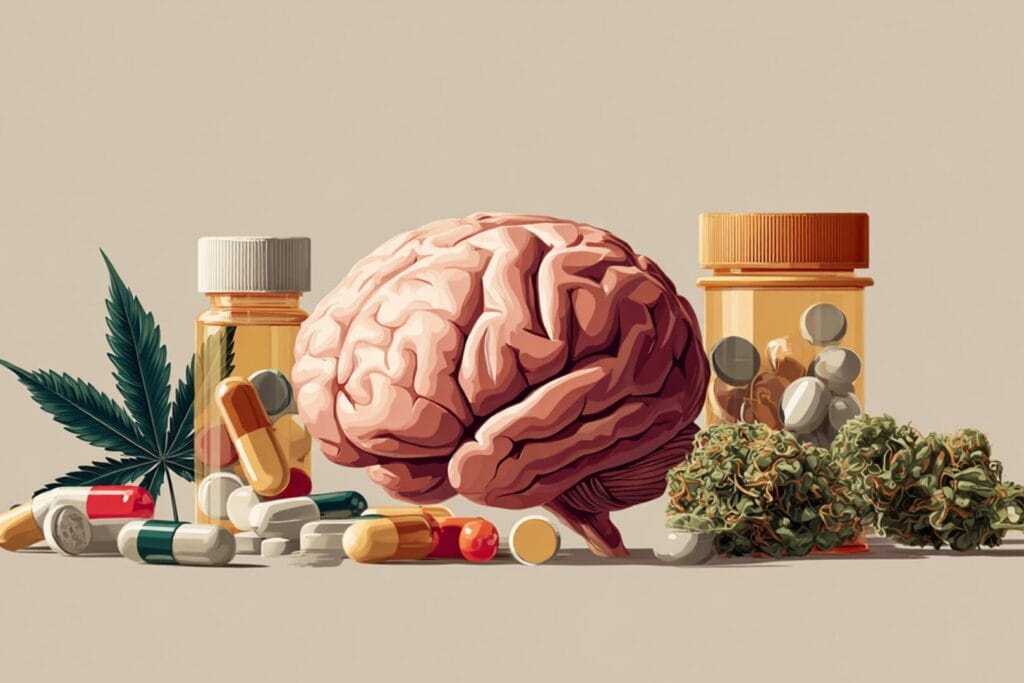Understanding Relapse
The term “relapse” describes the process of resuming drug or alcohol use after a long break. Addiction often results in relapses for many people who have attempted to reach and maintain sobriety, due to how much it can alter the brain’s chemistry and ultimately affect our mood and behaviors accordingly.
Even after undergoing successful addiction treatment, the urges to relapse do not subside. This is why it’s important to exercise both compassion and understanding when it comes to addiction and relapse related matters.
Addiction Relapse Overview
According to the National Institute on Drug Abuse, between 40-60% of patients with drug use disorders will experience relapse. This indicates that one may easily return to drug and alcohol use, just like how a person with heart disease or cancer may experience a relapse of symptoms having to do with their health condition as well.1
However, relapse does not mean that a person is doomed to relive their previous conditions of addiction. People can reintegrate into sobriety, even post-relapse, with the right support system and continuous effort and determination.
Stages of Relapse
The following are the common stages of relapse one might go through:
- Emotional Relapse: The first of the three stages of relapse is emotional relapse. The patient is not thinking about using the substance, but this stage is marked by the emergence (or reemergence) of unfavorable feelings like irritation, anxiety, or rage.
- Mental Relapse: This stage is marked by people actively exploring using substances again to deal with their emotional pain. It could first only begin as nostalgic thoughts about earlier drug-using periods.
- Physical Relapse: The last stage of drug usage is physical relapse, including the proactive actions used to get drugs. These can entail calling a dealer or going to a business that sells alcohol.
Common Causes of Relapse
It is essential to know specific causes that might result in a relapse, along with plans for how to potentially deal with that happening. The following are possible causes that might result in a relapse:2
Stress
One of the top causes of addiction relapse is stress. Many people who battle addiction resort to their preferred drug or pastime as a maladaptive coping mechanism. Studies show that people who use drugs, alcohol, or other addictive behaviors more often have heightened desires under stressful situations, especially if they use that behavior or substance as their primary coping mechanism.3
People
The ones who support a patient with addictive behavior might also cause a relapse. Even the family members could act as a cause, mainly if they make one feel more helpless and defenseless. The same is true for areas that conjure up memories of addiction for patients.
Overconfidence During Recovery
Although recovery is a never-ending process, some people start to believe that if they have overcome their condition that they no longer have to worry about “fully” relapsing. One may be tempted to take “just one” drink or hit, believing it won’t be a huge concern. While having a fair dose of self-confidence is crucial, self-awareness is also essential.
Physical or Mental Illness
Relapses in drug or alcohol use can be brought on by anxiety, panic, and other underlying psychological issues. The body is under stress from physical disease and discomfort, which increases the chance of relapsing. Prescription medications for physical and mental problems can affect consciousness and cause a relapse into addiction.
Relationships and Sex
There are various causes for why therapists advise not to go right into a new relationship during recovery. One is that starting new romantic relationships may increase your chance of relapsing. If one splits up with a new partner, one can turn to drugs again due to the stress.
How to Create Relapse Prevention Plan for Drug Addiction
There are many ways one can start the process for creating a relapse prevention plan. These include:
- Set a recovery goal: A recovery goal is fundamental in creating a relapse prevention plan, which may help foster the process and to avoid any loopholes
- Avoid places linked with substance use: You may want to avoid places you’ve been to when you were using the substance.
- Think deliberately: Don’t act subjectively. Instead, be deliberate about your thoughts and have a to-do list of your goals.
- Make a daily or weekly routine: A daily or weekly routine will help you maintain the plan and track your program.
- Know the warning signs: Be aware of the warning signs when they come.
- Create an emergency contact list: Create a list of your close friends and family members that are accessible in emergencies.
- Define actions to take: Know what steps to take beforehand.
Relapse Prevention Skills
There are many prevention methods you can employ in order to help with a potential relapse before it even happens. Some of these include:
- Self-care: Self-care helps to keep the body in proper shape. One must set goals for a daily self-care routine.
- Regular exercise: Exercising helps to release the hormone “dopamine” that is responsible for the feeling of happiness. It also helps to curtail the desire to relapse since one gets a very similar feeling they get when they use drugs or drink alcohol.
- Joining a self-help group: A self-help group with like-minded people can help to prevent relapse.
- Meditation: Meditation is good for the mind. It helps to clear negative thoughts in your mind and allows you to focus.
- Distracting and rewarding yourself: A distraction is good for you because it helps you forget about your worries, while rewarding yourself can give you encouragement to keep going through difficult times.
- Relaxation: While you relax, you allow your body to be energized and rejuvenated.
- Building a support network: Support from friends, family, and people you just met can also be helpful.
Get Professional Help at San Diego Detox Today
San Diego Detox’s goal is to assist those struggling with addiction to live extraordinary lives. We provide all-encompassing care for the complete person and are dedicated to improving addiction and mental health treatment’s effectiveness, efficiency, and affordability.
What Is a Relapse Prevention Plan?
A relapse prevention strategy can reduce the likelihood of drug recurrence by recognizing potential causes and coping methods. It can be a verbalized plan or a written plan.
What is Relapse Prevention?
Relapse prevention is a cognitive-behavioral method based on skills that enable patients and their physicians to recognize circumstances that increase the likelihood of relapse.
This plan will help patients to actively work against thoughts or feelings that may lead them to want to use substances again. This is mainly created for those that might have been struggling with addiction for a long time, or those that are still new to the recovery process.
Basic Principles of Relapse Prevention Plans
Creating a prevention plan is easy when you know the basic principles of how to create one. These include:
- Spending time reflecting and self-evaluating
- Understanding your potential causes and warning signs of relapsing
- Preparing for the worst thing that might happen, which is where not being overconfident comes into play as well
- Maintain your relationships with close friends and family
- Establish objectives for a healthy and active lifestyle
Resources
- https://www.niaaa.nih.gov/alcohols-effects-health/overview-alcohol-consumption/what-standard-drink
- https://www.drugfreeworld.org/drugfacts/alcohol/short-term-long-term-effects.html
- https://www.ncbi.nlm.nih.gov/pmc/articles/PMC2913110/
- https://www.webmd.com/mental-health/addiction/understanding-alcohol-abuse-symptoms






